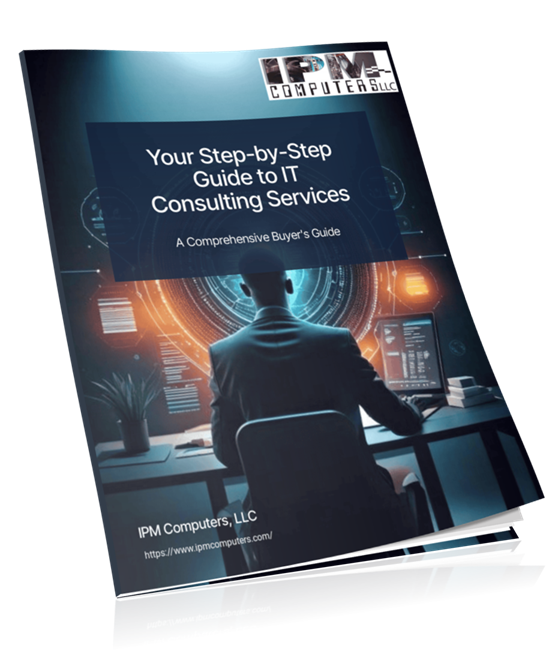Managed IT is essential in today’s business world. They provide an effective way for business owners to proactively handle their technological needs. Here’s a quick look at what these services include:
- Proactive IT Management: Managed IT offers constant monitoring and support to keep systems running smoothly.
- Cost-Effective Solutions: By outsourcing IT management, businesses can reduce expenses on staffing and infrastructure.
- Focus on Core Activities: With experts taking care of technology, business owners can prioritize growth and customer service.
Technology is crucial for business operations. As your business becomes more dependent on technology, the advantages of outsourcing IT management become obvious. Opt for managed services to ensure smooth operations that boost productivity and security, enabling your business to succeed.
Understanding Managed IT Services
Managed IT refers to the comprehensive management of an organization’s IT infrastructure and end-user systems, delivered by a third-party provider known as a Managed Service Provider.
- Scope: These services encompass a wide range of functions, including network monitoring, data backup and recovery, cybersecurity measures, software updates, and strategic consulting.
- Proactive Approach: Unlike traditional IT support that reacts to issues as they arise, managed services focus on preventing problems before they occur through continuous monitoring and maintenance.
MSPs serve as the backbone of managed IT. They offer:
- Expertise: A team of experienced professionals with diverse knowledge in various technology areas.
- Proactive IT Support: MSPs utilize advanced tools to monitor systems 24/7, quickly addressing any potential issues to minimize downtime.
- Customized Solutions: They tailor their services to align with your business objectives, ensuring that technology becomes a catalyst for growth rather than a burden.
Leveraging managed IT allows small businesses to focus on core activities while benefiting from specialized expertise in IT management.
Benefits of Managed IT Services for Small Businesses
1. Cost Efficiency
Managed IT provides a streamlined approach to technology management that can lead to substantial cost savings for small businesses. By outsourcing IT management, you eliminate the need for an in-house team, which often comes with high salaries, benefits, and training expenses. Consider the following aspects of cost efficiency:
- Fixed Monthly Fees: Engaging with a MSP typically involves a predictable monthly fee. This arrangement helps you avoid unexpected costs associated with emergency repairs or system failures.
- Reduction in Downtime: Proactive monitoring and maintenance from MSPs significantly reduce downtime. Less downtime translates directly into increased revenue as your operations run smoothly without interruptions.
- Access to Advanced Technology: MSPs invest in cutting-edge technology and tools that might be cost-prohibitive for small businesses to acquire independently. This access allows you to leverage the latest innovations without incurring heavy capital expenditures.
- Scalability: As your business grows, your IT needs will evolve. Managed services offer on-demand resources that scale effortlessly with your business growth. This flexibility ensures you only pay for what you use.
- Expertise Without Overhead: Outsourcing provides access to a skilled team of professionals across various technology disciplines. Instead of hiring multiple employees for specific roles, you gain comprehensive expertise from your MSP at a fraction of the cost.
The financial benefits extend beyond immediate savings. Investing in managed services can enhance long-term financial health by providing strategic planning and insights into technology investments that align with your business goals.
2. Increased Productivity
Outsourcing IT management allows you to focus on core business functions while experts handle technology-related tasks. This shift boosts overall productivity as employees can dedicate their time and energy to driving growth rather than dealing with technical issues.
With managed services managing IT systems, your team gains:
- Faster Problem Resolution: MSPs provide rapid response times for any issues, ensuring minimal disruption to daily operations.
- Streamlined Processes: Automation tools implemented by MSPs enhance operational efficiency, resulting in standardized processes and consistent outputs.
Investing in managed IT services supports productivity enhancement by freeing up internal resources and allowing your team to concentrate on delivering value to customers.
3. Enhanced Security Measures
Strong cybersecurity is crucial for small businesses. Working with MSPs offers a comprehensive way to protect your business from online threats. Here’s what they provide:
- Firewalls: MSPs use advanced firewall solutions to create a barrier between your internal network and external dangers.
- Encryption: Data encryption keeps sensitive information secure, whether it’s being sent or stored.
- Regular Security Audits: Routine inspections find weaknesses and ensure compliance with industry rules.
A solid cybersecurity plan reduces the risks of data breaches and cyberattacks, which can result in significant financial losses and damage to your reputation.
By investing in these services, you strengthen your business against ever-changing threats while freeing yourself to concentrate on essential operations. The combination of increased productivity, cost-effectiveness, and improved security creates a safer business environment that encourages growth.
Features to Look for in an IT Service Provider
1. Network Monitoring for Performance Optimization
Continuous network monitoring is a cornerstone of managed IT services. This proactive approach enables businesses to identify and address issues before they escalate into significant problems, ensuring seamless operations. Here’s how effective network monitoring can benefit your organization:
- Real-Time Issue Detection: Constant surveillance allows for the immediate identification of performance bottlenecks or system failures. By addressing these issues promptly, downtime is minimized, which can significantly impact productivity and revenue.
- Performance Metrics Analysis: Service Providers use advanced tools to analyze performance metrics. This data-driven approach provides insights into network health, helping you make informed decisions about infrastructure improvements or upgrades.
- Predictive Maintenance: Proactive monitoring not only resolves current issues but also anticipates future problems. By analyzing historical data, MSPs can predict potential failures and schedule maintenance before they disrupt business operations.
- Enhanced Resource Allocation: With continuous network monitoring, businesses gain clarity on resource usage. This insight allows for better allocation of bandwidth and computing resources, optimizing overall efficiency.
Investing in a provider that emphasizes robust network monitoring ensures you stay ahead of potential disruptions. As your business grows, scalable monitoring solutions adapt to changing needs without compromising performance.
When assessing managed service providers, inquire about their monitoring protocols:
- What tools do they use for network surveillance?
- How frequently do they analyze performance data?
- What measures are in place for alerting you of critical issues?
The answers to these questions provide valuable insight into the effectiveness of their monitoring capabilities.
A well-rounded managed IT service provider will not only monitor your network but also offer comprehensive support to enhance your business’s overall digital landscape. They should align their services with your specific operational goals, ensuring that technology serves as an asset rather than an obstacle in your growth journey.
2. Importance of Data Backup and Disaster Recovery Plans
Data loss can be devastating for small businesses. Regular data backups are crucial to prevent incidents that could disrupt operations. MSPs implement strong data backup solutions, making sure your important information is safely stored and easily accessible.
Key aspects of effective data backup strategies include:
- Automated Backups: Scheduled backups reduce the risk of human error and guarantee that the most recent data is always saved.
- Cloud Storage Solutions: Using cloud technology offers flexibility, allowing for simple data restoration from almost anywhere.
Besides data backups, disaster recovery plans are essential for keeping the business running. MSPs create detailed strategies that include:
- Rapid Recovery Processes: These plans specify actions to quickly restore systems and applications after an interruption.
- Regular Testing: Simulating recovery processes ensures they function correctly and helps identify weaknesses before a real incident happens.
Combining regular data backups with disaster recovery plans strengthens your business against possible losses. Together, they’re a fundamental part of managed IT, improving not just security but also operational strength.
3. Regular Software Updates and System Checks for Security and Efficiency Maintenance
Keeping software up-to-date is crucial for maintaining security and performance across your IT systems. Regular software updates provide essential patches that address vulnerabilities, preventing potential breaches that could compromise sensitive data. The importance of continuous network monitoring ensures that any anomalies are detected early, allowing for immediate remediation before they escalate into significant issues.
Benefits of regular software updates include:
- Enhanced Security: Timely updates protect against known threats, reducing the risk of cyberattacks.
- Performance Optimization: Updated software often includes performance enhancements, leading to smoother operations.
- Compatibility: Ensures that all applications work seamlessly together, avoiding conflicts that can disrupt business activities.
When evaluating a comprehensive IT service package, consider these essential features:
- Continuous Network Monitoring: Proactively identifies and resolves issues in real-time.
- Data Backup and Recovery Solutions: Guarantees data integrity and availability.
- Regular Software Maintenance: Ensures systems remain current and efficient.
Prioritizing these elements allows small businesses to maintain optimal functionality in their operations while safeguarding their digital assets.
Choosing the Right Service Provider for Your Business
Selecting an effective MSP is crucial for your business’s success. Consider the following guidelines to ensure you make an informed decision:
1. Experience and Expertise
Look for providers with a proven track record in the industry. Evaluate their certifications, client testimonials, and case studies that highlight successful projects relevant to your business.
2. Service Offering Alignment
Ensure the MSP’s services align with your specific business goals. Identify your IT requirements and confirm that the provider can meet them comprehensively. This alignment is essential for maximizing efficiency and productivity.
3. Scalability
Choose an MSP that can grow with your business. As you expand, your IT needs will evolve. A reliable provider should offer scalable solutions that adapt to changing demands.
4. Communication and Support
Evaluate their customer support structure. Are they available 24/7? Effective communication is key to addressing issues swiftly and maintaining seamless operations.
5. Security Measures
Investigate the cybersecurity protocols implemented by the MSP. Robust security measures protect against threats, ensuring your data remains secure.
Future-proofing Your Business with Technology Through Managed IT
Embracing technology through managed IT services positions your business for long-term success. Consider the following advantages:
1. Scalability
As your business grows, MSPs offer on-demand resources that adjust to your needs without the burden of significant capital investment. This flexibility allows you to focus on core activities.
2. Access to Expertise
Partnering with an MSP ensures that you have a team of experienced professionals managing your IT infrastructure. Their insights into the latest technologies enhance your competitive edge.
3. Enhanced Cybersecurity
Robust protection against cyber threats is essential for safeguarding sensitive data. MSPs implement advanced security measures that are crucial for maintaining customer trust and compliance with regulations.
4. Business Continuity
Comprehensive disaster recovery plans and regular data backups minimize disruptions in case of emergencies. This preparedness is vital for maintaining operations, even during unforeseen events.
Empowering Your Business IT: The Strategic Advantage of Managed Services
Embracing technology through managed IT services is crucial for small businesses aiming to thrive. Key benefits include:
- Enhanced Efficiency: Streamlined processes that improve productivity.
- Robust Security: Comprehensive cybersecurity measures protect against threats.
- Cost Savings: Predictable pricing structures reduce unexpected expenses.
Take the next step in securing your business by exploring reliable service providers. Find one that aligns with your unique needs and objectives to maximize your operational potential.
Frequently Asked Questions About Managed IT
What is managed IT and why are they important for small businesses?
Managed IT services refer to the outsourcing of IT management and support to a third-party provider, known as a Managed Service Provider (MSP). For small businesses, these services are crucial as they ensure seamless technology functionality, enhance operational efficiency, and allow owners to focus on core business activities while benefiting from expert IT support.
How can managed IT lead to cost efficiency for small businesses?
Managed IT can significantly reduce costs for small businesses by eliminating the need for an in-house IT team. By outsourcing, companies can access a range of IT solutions at a predictable monthly cost, avoiding unexpected expenses related to hiring, training, and maintaining internal staff.
In what ways do managed IT enhance productivity for small businesses?
By outsourcing IT management to MSPs, small businesses can increase productivity as employees can concentrate on their primary roles without being distracted by technical issues. Proactive support from MSPs ensures that systems run smoothly, and any potential disruptions are addressed before impacting operations.
What security measures do Managed Service Providers offer to protect small businesses?
MSPs provide robust cybersecurity measures including firewalls, encryption, and continuous monitoring to safeguard against cyber threats. These services are essential for small businesses to mitigate risks associated with data breaches and ensure compliance with industry regulations.
What key features should I look for in a Managed Service Provider?
When selecting an MSP, look for features such as continuous network monitoring, data backup and recovery plans, and regular software updates. These elements are vital for optimizing performance, preventing data loss, and maintaining security across your IT infrastructure.
How can I choose the right Managed Service Provider for my business needs?
To choose the right MSP, evaluate potential providers based on their experience, expertise in your industry, and alignment with your specific business goals. It’s important to assess their service offerings and ensure they can cater effectively to your unique technological requirements.






